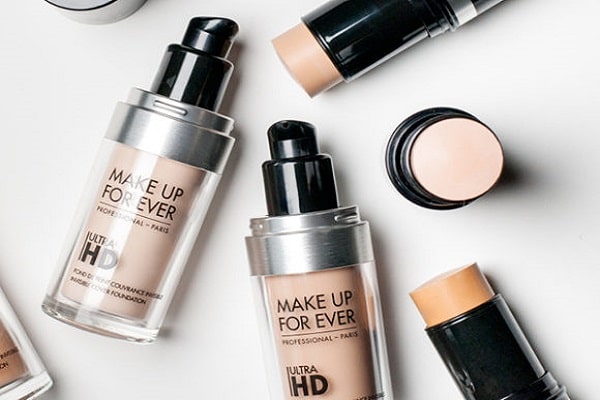Natural vs Conventional Cosmetics: What Is The Difference?
What is the difference between natural and conventional cosmetics? If you have come this far, it is because you are surely thinking about changing cosmetics and you are wondering what is better for you… Natural vs conventional cosmetics?
Knowing what is best for you depends on what you are looking for for your skin. So, we are going to explain the main differences between natural and traditional cosmetics so that you can evaluate each one and make the decision that best suits your needs.

If this interests you, we invite you to discover all the information on “natural vs conventional cosmetics.”
Difference between natural and conventional cosmetics
To understand the difference between natural and conventional cosmetics, it is important that you know some basic concepts.
On the one hand, natural cosmetics seek to respect the natural balance of the skin and its regeneration process, so in its formulation, it uses ingredients of natural origin that are compatible with its pH.
However, conventional cosmetics incorporate synthetic ingredients that are sometimes derived from petroleum and are inadvisable because they can clog pores and cause allergies in the most sensitive skin.
Therefore, the most significant difference between natural and conventional cosmetics is in their formulation and in the ingredients used to make the product.
Let’s continue to delve into this difference!
The main difference between natural and conventional cosmetics
When we talk about cosmetics, we are not only referring to moisturizing creams or eye contour creams, but to any hygiene product that you can use in your day-to-day life: body gels, shampoos, aftershave, deodorant, hand soap, makeup… etc.
So you can imagine the number of chemical agents that you apply every day when you use a certain type of cosmetic.
And this is where the main difference between natural and conventional cosmetics lies.
Natural cosmetics are nourished by oils, essences and floral waters that respect the natural pH, thus avoiding possible allergic reactions that, perhaps, you did not know you had.
To give you an example, no one is born knowing that they are allergic to sulfates or to a certain chemical. And, when discomfort or a skin reaction appears after the application of a product, you tend to think that it is something that you have eaten or related to food.
It is not something that you discover until you go to a dermatologist to understand the cause of dermatitis that has arisen as a reaction to that product.
Most cosmetics, in addition to the main active ingredient in their composition, incorporate preservatives and perfumes that make it more commercial and attractive to consumers but that are sometimes intolerable for the skin.
For this reason and due to ecological awareness, in recent years, the use of natural cosmetics has grown substantially with respect to conventional cosmetics.
We are increasingly concerned about the food we eat, the textile materials in our clothes, sustainability and the environment, and in general, about everything that comes into contact with us.
Read Also: How To Choose The Best Face Cream
Therefore, in addition to the origin of the cosmetic ingredients, you may be concerned about how these ingredients are produced, even if the product label says that they are of natural origin.
Now, we are going to go one step further and explain other related concepts that may be of interest: how natural cosmetics differ from organic cosmetics.
Natural vs organic cosmetics
Natural cosmetics differ from organic cosmetics, not in the origin of the ingredients used, but in how their manufacturing process has been and where these ingredients are obtained.
The term ‘natural’ is not protected and its use in cosmetics can lead to confusion, sometimes intentionally by manufacturers.
This is important because a product with packaging in natural colors like green or brown, along with bold text that says ‘natural’ may make you think you’ve found a product panacea for your skin, when, perhaps, only 1% of that product is of natural origin and has been processed in a laboratory. And be careful, this not only happens in cosmetics, but it is a practice widely used in food as well.
On the contrary, in the field of organic cosmetics there are different certifications that guarantee sustainable manufacturing processes and that give us more confidence.
The requirements to obtain these certifications are not the same for all of them, however, there are many that are common to all of them, such as having a minimum percentage of ingredients that come from organic farming, that no chemical fertilizers or herbicides have been used on the land, that no include preservatives, dyes or synthetic compounds…etc.
In any case, you will discover many benefits of organic cosmetics products as we will see later.
“Okay, but… does natural cosmetics work the same as conventional cosmetics?”
We’ll tell you right away.
Natural vs conventional cosmetics: do they give the same results?
You may be worried that, by switching from conventional to natural cosmetics, you will lose the results that you have already become accustomed to with your usual cosmetic. That thought of “yes, yes, very natural, but surely it does not work the same” may invade you.
Don’t worry, we tend to be faithful to what we know and it is normal for you to have doubts. That is why we are going to try to clear them so that you can find the products that best benefit you.
If you look at the packaging, the cosmetics have their ingredients written in Latin. This is due to the INCI system, which stands for ‘International Nomenclature of Cosmetic Ingredients. This system standardizes the name of each ingredient at an international level and serves to be recognized and thus avoid identification errors.
The INCI list of a cosmetic is usually ordered from highest to lowest, according to its percentage of presence in the product formula, so it gives us the information we need to know which is the main active ingredient and which ones have a greater or lesser presence.
While traditional cosmetics is very concerned with texture, aroma or its conservation and, therefore, must resort to chemical and/or synthetic ingredients, natural cosmetics have a more transparent INCI, in which natural active ingredients abound.
You can identify without having a university degree in chemistry and a master’s degree in pharmacy.
Once this part is understood, we can confirm that the effect of a natural cosmetic vs. a conventional one may be superior.
When you apply a product to the skin where everything is active ingredients, everything has a specific function and its absorption improves remarkably.
Using products of natural origin makes the skin more permeable and more active, since it does not have to reject ingredients that are unknown or harmful to it. This ensures that the results after its application are faster and more efficient.
Natural and ecological cosmetics respect the natural balance of the skin, being easier to tolerate in all skin types, but especially in sensitive skin.
Now that you know the differences between natural and conventional cosmetics, we ask you:
What is better for your skin? Natural cosmetics or conventional cosmetics? Ingredients of natural origin with transparent manufacturing processes or an endless list of synthetic compounds whose origin is unknown?
Before you answer, we want to make you one last reflection.
It is believed that natural cosmetics are better for sensitive skin and sometimes we forget that it is better for ALL skin types. The natural will always be better than the synthetic in terms of efficacy, product guarantees and sustainability.
And, the thing is, your skin is constantly exposed to external agents that can damage it: sun, cold, pollution, make-up, poor hygiene habits (such as not removing make-up correctly) and, now, with the use of masks, even more so.
For this reason, the skin needs to restore its balance and you must bear in mind that it is not impervious to the products you use.
Read Also: Health Risks of Improper Use of Lightening Creams [Cosmetics Risks]
So, the substances that you apply to the skin pass through the upper layers and penetrate inside, so you must be careful with what you choose and pay close attention to its ingredients to avoid unwanted side effects that, far from obtaining the result you are looking for, they create a bigger problem for you.
Do you already have your answer? Use the comment section.




![Benefits Of Hydration For Dry Skin [+Guide On How To] 6 Benefits Of Hydration For Dry Skin](https://naijaxtremefashion.com/wp-content/uploads/2022/08/benefits-of-hydration-for-dry-skin-min.jpg)


Thank you for your sharing. I am worried that I lack creative ideas. It is your article that makes me full of hope. Thank you. But, I have a question, can you help me?
Thank you for your sharing. I am worried that I lack creative ideas. It is your article that makes me full of hope. Thank you. But, I have a question, can you help me?
Your point of view caught my eye and was very interesting. Thanks. I have a question for you.
I am really impressed with your writing skills as smartly as with the structure in your blog. Is this a paid topic or did you modify it your self? Anyway keep up the nice high quality writing, it is uncommon to see a nice blog like this one today!
Thanks for sharing. I read many of your blog posts, cool, your blog is very good.
Your point of view caught my eye and was very interesting. Thanks. I have a question for you.
Thank you for your sharing. I am worried that I lack creative ideas. It is your article that makes me full of hope. Thank you. But, I have a question, can you help me?
Can you be more specific about the content of your article? After reading it, I still have some doubts. Hope you can help me.
Your article helped me a lot, is there any more related content? Thanks!
Thank you very much for sharing, I learned a lot from your article. Very cool. Thanks.
Your point of view caught my eye and was very interesting. Thanks. I have a question for you.
Can you be more specific about the content of your article? After reading it, I still have some doubts. Hope you can help me.
Can you be more specific about the content of your article? After reading it, I still have some doubts. Hope you can help me. https://www.binance.info/sk/register-person?ref=OMM3XK51
Your point of view caught my eye and was very interesting. Thanks. I have a question for you.
I don’t think the title of your article matches the content lol. Just kidding, mainly because I had some doubts after reading the article.
Thanks for sharing. I read many of your blog posts, cool, your blog is very good.
Your article helped me a lot, is there any more related content? Thanks!
Thank you for your sharing. I am worried that I lack creative ideas. It is your article that makes me full of hope. Thank you. But, I have a question, can you help me?
Can you be more specific about the content of your article? After reading it, I still have some doubts. Hope you can help me.